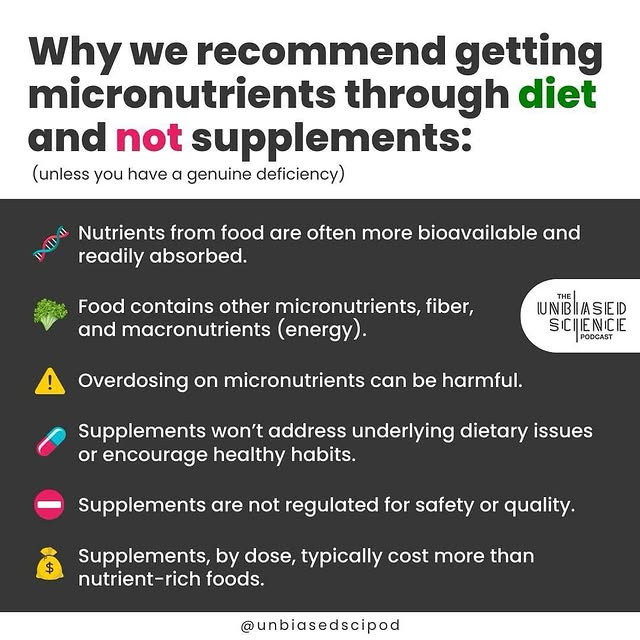What Would a Cavewoman Really Think of $60 Supplements?
Why the produce aisle is more "primal" than any supplement bottle
The supplement industry has found a lucrative new target: women frustrated with a healthcare system that has historically dismissed their concerns. Enter Primal Queen, a company that claims to solve everything from low energy to hormonal imbalances with pills containing bovine uterus and other organ meats. With nearly 200,000 Instagram followers and a "viral on TikTok" badge on their packaging, these supplements represent a troubling trend where slick marketing meets what scientists call the "appeal to nature fallacy"—the mistaken belief that natural automatically means better, safer, or more effective.
This case study in supplement marketing reveals how companies can exploit both legitimate health concerns and cognitive biases to sell products that operate in regulatory gray areas, leaving consumers to navigate claims that sound scientific but may lack rigorous evidence. Let’s discuss…
The Royal Rundown: What You Need to Know
If you haven't encountered Primal Queen on social media yet, here's what they're selling:
The product: Pills containing a proprietary blend of 337.5 mg of bovine uterus, fallopian tube, ovary, liver, kidney, and heart powder, plus anti-caking agents in gelatin capsules
The promise: Through vitamins, minerals, and omega-3 fatty acids "straight from the natural source rather than lab-made," these pills claim to be a panacea for women's health
The price: $60 for 60 capsules—that's $2 per day for the recommended dosage, compared to roughly $0.04 per day for a typical multivitamin
The credentials: Third-party testing through Eurofins laboratory, with analytical composition results available on their website
The Appeal to Nature Fallacy in Action
Primal Queen's marketing strategy centers on what researchers term the "appeal to nature fallacy"—the cognitive bias that leads people to assume anything "natural" is automatically superior to synthetic alternatives. This logical fallacy ignores the reality that many naturally occurring substances, like mercury or arsenic, can be harmful to humans, while many synthetic compounds are both safe and beneficial.
The company builds its brand around the claim that modern women should eat like "carnivorous cavewomen" to optimize their health. However, the assertion that our ancestors followed carnivorous diets oversimplifies archaeological evidence. Isotope analysis of pre-agricultural human remains from Morocco, for example, indicates early humans were highly reliant on plant foods.
The irony is notable: Primal Queen appeals to primitivism while selling factory-processed supplements that depend entirely on modern technology. The appeal to nature fallacy becomes particularly apparent when you consider that truly following ancestral eating patterns would involve foraging for diverse plant foods and occasionally hunting, not swallowing pills manufactured in industrial facilities.
Magic Pill Promises: A Timeline of Dubious Claims
On Primal Queen's website, you can count twenty-two separate health claims ranging from "increased sex drive" to "better vision" to "delayed signs of aging." They've even created a month-by-month timeline for the first year of use, presumably so customers can track their "progress" toward optimal health. Let's examine these claims:
Week 1: "Likely lift energy, mood, and cognition due to Vitamin B12, Zinc, and Copper"
Most Americans are not deficient in Vitamin B12 and can easily obtain it through animal products or fortified foods for vegans
While approximately 15% of Americans don't consume enough zinc, a varied diet including meat or legumes typically provides adequate amounts
Copper deficiency is rare in the USA, and over-supplementing zinc can actually interfere with copper absorption
Month 1: "Likely reduce iron deficiency leading to increased vitality, sex drive, and overall well-being"
"Vitality" and "overall well-being" are classic wellness buzzwords—they sound meaningful but are impossible to measure scientifically. While abnormal uterine bleeding can cause iron deficiency and sexual dysfunction in women, any suspected iron deficiency should be diagnosed and treated by a healthcare professional. The analysis from a third-party tester shows 0.0013% iron in the sample, which is a very small amount. This is also the result from testing one batch of the supplement and there is no iron amount included on the packing of the supplement. This makes it impossible to evaluate the actual amount of iron included in a serving of Primal Queen supplements.
Month 2: "Abundance of B vitamins will lead to better mood, higher energy, healthier immune system, decreased stress, and improved red blood cell production"
B vitamins are water-soluble, meaning they must be replenished daily and are easily obtained from common foods, including animal proteins, dairy products, leafy greens, and legumes. Increasing B-vitamin intake through dietary variety is both more affordable and more effective than supplementation for most people.
Month 3: "Consistent natural vitamin A from beef organs can lead to better signs of skin health, delayed signs of aging, reduced acne, and better vision"
Less than 1% of Americans are at risk for vitamin A deficiency, according to the National Health and Nutrition Examination Survey. This claim targets cosmetic concerns rather than addressing actual nutritional needs.
Month 6: "Blend of vitamins, minerals, and amino acids found in beef organs peak for enhanced mental clarity, better muscle function, and improved recovery after physical activities"
This vague statement doesn't specify which vitamins, minerals, or amino acids provide these benefits. The six-month timeline appears arbitrary—why would these nutrients "peak" at exactly six months, and why would benefits plateau or decline afterward? This timing likely encourages customers to continue purchasing for six months before expecting results.
Month 12: "Proteins that impact women's health have reached optimized levels which can result in optimal menstruation and menstrual flow, properly balanced hormones, and less menstrual cramps and hot flashes"
There's no such thing as "optimal" menstruation. Healthy menstrual cycles can range from 21-35 days, and some menstrual discomfort is normal. Reproductive health concerns deserve proper medical attention, not expensive supplements with vague promises. Changes during menstruation and menopause are natural processes, and significant symptoms should be discussed with healthcare providers, not self-treated with unproven pills.
The Research Mirage: When "Clinical Studies" Aren't Clinical Studies
Primal Queen proudly claims their products are backed by "randomized, triple-blind placebo-controlled trials." However, finding this research requires navigating to a buried drop-down menu at the bottom of their website, where you'll discover that their "clinical trial" was conducted by Citruslabs, a company specializing in consumer product testing, not medical research.
This study fails to meet basic standards for legitimate clinical research:
Not peer-reviewed: No independent scientists have evaluated the methodology or conclusions
Not registered: If this were a legitimate clinical trial, it would be required to register with clinicaltrials.gov
Not published: The results exist only as a white paper on Primal Queen's website
Statistically insignificant results: The study found 24% of the Primal Queen group reported reduced PMS symptoms versus 18% in the placebo group—a difference that could easily be due to random chance (p-value: 0.118, well above the 0.05 threshold for statistical significance)
Despite acknowledging this isn't a statistically significant difference, the paper misleadingly states this "indicates significantly less severe PMS symptoms." This is either incompetent or intentionally deceptive communication of statistical results.
The only other "research" supporting organ meat consumption is a medical white paper by "Dr. Jessica, PharmD," a biased literature review that cherry-picks animal studies to argue for carnivorous diets and positions organ meats as "nature's multivitamin."
Targeting Women: Pink Pills and Feminist Marketing
Primal Queen specifically targets women with taglines like "100% formulated by women, for women (sorry guys!)" and urges "busy women, female athletes, mothers, and health conscious queens" to "prioritize their health" and "unleash their inner queen." This marketing strategy exploits a vulnerable population that often feels neglected by the healthcare system.
Women's health is indeed chronically underfunded in research. Gynecological conditions like endometriosis affect 10% of women but take an average of 8 years to diagnose. These legitimate healthcare gaps create fertile ground for companies like Primal Queen to position themselves as allies while charging premium prices for unproven solutions.
Instead of advocating for better research funding or more affordable healthcare options, Primal Queen capitalizes on women's frustration by offering expensive false hope wrapped in empowering language.
The Proprietary Blend Problem
Like many supplements, Primal Queen uses a "proprietary blend"—a major red flag that should concern consumers. Proprietary blends allow companies to hide the specific dosages of individual ingredients, making it impossible to:
Verify if ingredients are present in therapeutic amounts
Identify potential interactions with medications
Determine if you're getting too much of certain nutrients
Compare products effectively
This opacity serves manufacturers' interests, not consumers' health. Without knowing exact dosages, you can't make informed decisions about safety or efficacy.
The Regulatory Vacuum: How Supplements Slip Through Safety Nets
The supplement industry operates under regulations that differ significantly from those governing prescription and over-the-counter drugs because dietary supplements are regulated under the “umbrella” of foods. The law gives the FDA the authority to oversee supplements through post-market surveillance for unsafe products rather than by requiring companies to provide safety information to the FDA for pre-market evaluation and approval, as long as products don't contain new dietary ingredients that weren't sold before 1994, with limited exceptions. Depending on a company’s claims about its dietary supplement, efficacy testing may not be required either.
This regulatory framework means:
No pre-market safety evaluation by FDA required for many supplement ingredients
No efficacy proof needed before making certain health claims (with specific disclaimer requirements)
Limited oversight of manufacturing processes and facilities compared to pharmaceutical standards
Reactive rather than proactive regulatory enforcement, typically occurring only after problems are reported
To help individuals distinguish between products that have been evaluated by FDA as drugs (safe and effective) and dietary supplements that have not, supplement packages claiming certain types of health or nutrition benefit must include the FDA disclaimer: "This statement has not been evaluated by the Food and Drug Administration. This product is not intended to diagnose, treat, cure, or prevent any disease."
Under current regulations, companies may make health claims in advertising and labeling, but they must have a reasonable basis—typically including scientific evidence—to support those claims. If the scientific support is limited, they are required to clearly and conspicuously disclose those limitations to avoid being deceptive. This often creates an environment where marketing departments have more influence over product messaging than scientific evidence and medical researchers.
Understanding Industry-Wide Patterns
The Primal Queen case study illustrates broader patterns in supplement marketing that consumers should recognize:
Identify underserved populations (women frustrated with healthcare gaps)
Leverage cognitive biases (appeal to nature fallacy, ancestral nutrition claims)
Create elaborate benefit lists (multiple health claims targeting various concerns)
Provide minimal supporting evidence (single non-peer-reviewed studies)
Employ premium pricing strategies (positioning high cost as an indicator of quality)
Use empowering messaging (feminist language, community building)
This approach appears effective because it addresses real problems—such as research gaps in women's health—while offering solutions that may not have robust scientific support. The regulatory environment allows this marketing approach to flourish, since companies can make health claims while disclaiming medical responsibility.
The Bottom Line
Most Americans can obtain all the vitamins and minerals in Primal Queen supplements through a varied diet that costs far less than $60 per month. While beef organs do contain higher concentrations of certain nutrients than vegetables, eating a surplus of vitamins and minerals doesn't automatically translate to health benefits. In fact, it's possible to over-supplement and interfere with nutrient absorption—there are established upper intake levels for most vitamins that shouldn't be exceeded.
If you have genuine concerns about nutritional deficiencies or health symptoms, consult with a healthcare provider who can order appropriate tests and recommend evidence-based treatments. The current regulatory environment for supplements means consumers must be particularly vigilant about evaluating health claims and understanding the limitations of available evidence.
The supplement industry will continue operating within existing regulatory frameworks while consumers navigate marketing claims that may sound scientific but lack rigorous validation. Understanding cognitive biases like the appeal to nature fallacy, recognizing the limitations of proprietary blends, and appreciating the differences between supplement and pharmaceutical regulations can help consumers make more informed decisions.
Rather than relying on supplements with questionable evidence, consider focusing on established health practices: eating a varied diet, getting regular medical care when needed, and approaching wellness claims with healthy skepticism. The most effective health strategy might be the least marketed one: working with qualified healthcare providers to address specific concerns with evidence-based approaches.
Stay curious,
Unbiased Science
P.S. Want to support our work? The best way is to subscribe to our Substack and share our content. While all our articles are always completely free to read, paid subscriptions help sustain our in-depth reporting on public health and science topics. Thank you for considering it!












This is 🙌. So astute. So right on. I’m sharing it with everybody I know who follows a pseudo-science influencer.
I posted this once already this morning, in regard to cancer chemotherapy, but it seems appropriate to this discussion as well:
As a cancer survivor, I would note that the Memorial Sloan Kettering Cancer Center in NYC produces an iPhone app called "About Herbs: A Guide to Botanicals, Supplemnts, Complementary Therapies, and More." Their FAQ states, "Alternative treatments are those used instead of mainstream therapies. They are unproven, expensive, and unsafe. We do not offer alternative medicine in this hospital. Complimentary medicine includes therapies that are used as adjuncts to mainstream cancer care. They are supportive measures that control symptoms, enhance well-being, and contribute to overall patient care. The benefits are usually supported by clinical studies and they are generally inexpensive." They then go on to discuss at length the interactions between common - and not so common - herbs and supplements that should never be used while on mainstream chemotherapy; those which may be helpful; and those which need consultation with your physician. The remainder of the app is a database of individual supplements and herbs - one explanation for patients, and a more detailed description with doi references to the NLM for professionals - which can be browsed alphabetically, or searched for a specific reference as needed. It is frequently (and has been for years), and I have found it very helpful personally and professionally.